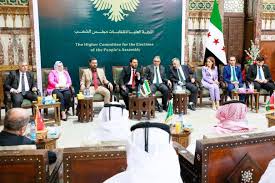Electoral Committees in Syria: Between the Legacy of the Past and the Challenges of the Future
September 6, 2025169 ViewsRead Time: 2 minutes

Font Size:
16
In a move aimed at closing the chapter of the past and opening a new one, the Supreme Electoral Committee in Syria announced the formation of subcommittees in preparation for the upcoming People's Council elections. This step, although technical in appearance, carries deep implications in the context of the transitional phase the country is undergoing.
Nawar Najma, the spokesperson for the Supreme Committee, confirms that these committees will form the "electoral bodies" through extensive consultations, focusing on the representation of women and various components of society. But the question arises: Can this mechanism produce a People's Council capable of representing the true aspirations of Syrians after years of division and suffering?
The Supreme Committee adopts a special approach to these elections, relying on "selection" instead of direct "appointment," by choosing known competencies and elites in society. This mechanism, as Najma explains, is necessary in the current phase due to the fragmented social reality and the deep wounds left by the past decades.
It is noteworthy that the committee is considering changing the name of the "People's Council" itself, which has been associated with negative memories for many Syrians. This symbolic change may be important to help the community move beyond the legacy of the past, but the real challenge will remain in the substance of parliamentary work, not in the naming.
The discussion about the freedom of criticism under the dome of the council raises questions about the nature of the personalities that the committees will choose. Najma emphasizes the need for members to be from "brave and bold elites" capable of expressing the aspirations of the people.
Recognizing the logistical difficulties of organizing full elections due to the lack of identification documents and demographic imbalances raises questions about the feasibility of any electoral process at this time. Can we talk about real representation under these circumstances?
These elections represent a real test of the readiness of Syrians to close the chapter of the past and build a true democratic future. Success will not be measured by the number of seats or names, but by the new council's ability to represent all shades of the Syrian spectrum, build real trust between the state and the citizen, and open the door to comprehensive national reconciliation. This is the real challenge facing the electoral committees and all Syrians.
Nawar Najma, the spokesperson for the Supreme Committee, confirms that these committees will form the "electoral bodies" through extensive consultations, focusing on the representation of women and various components of society. But the question arises: Can this mechanism produce a People's Council capable of representing the true aspirations of Syrians after years of division and suffering?
The Supreme Committee adopts a special approach to these elections, relying on "selection" instead of direct "appointment," by choosing known competencies and elites in society. This mechanism, as Najma explains, is necessary in the current phase due to the fragmented social reality and the deep wounds left by the past decades.
It is noteworthy that the committee is considering changing the name of the "People's Council" itself, which has been associated with negative memories for many Syrians. This symbolic change may be important to help the community move beyond the legacy of the past, but the real challenge will remain in the substance of parliamentary work, not in the naming.
The discussion about the freedom of criticism under the dome of the council raises questions about the nature of the personalities that the committees will choose. Najma emphasizes the need for members to be from "brave and bold elites" capable of expressing the aspirations of the people.
Recognizing the logistical difficulties of organizing full elections due to the lack of identification documents and demographic imbalances raises questions about the feasibility of any electoral process at this time. Can we talk about real representation under these circumstances?
These elections represent a real test of the readiness of Syrians to close the chapter of the past and build a true democratic future. Success will not be measured by the number of seats or names, but by the new council's ability to represent all shades of the Syrian spectrum, build real trust between the state and the citizen, and open the door to comprehensive national reconciliation. This is the real challenge facing the electoral committees and all Syrians.